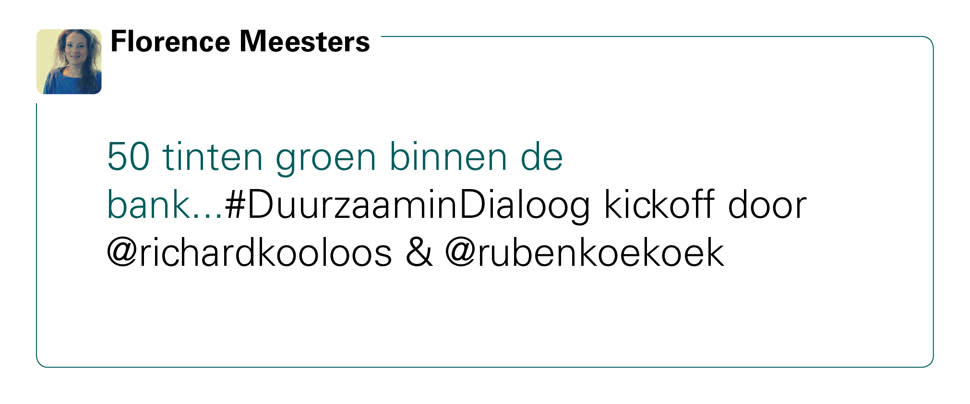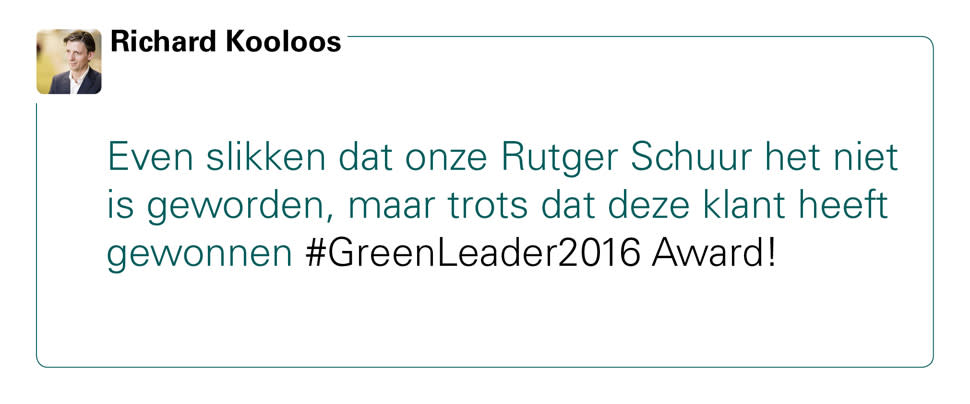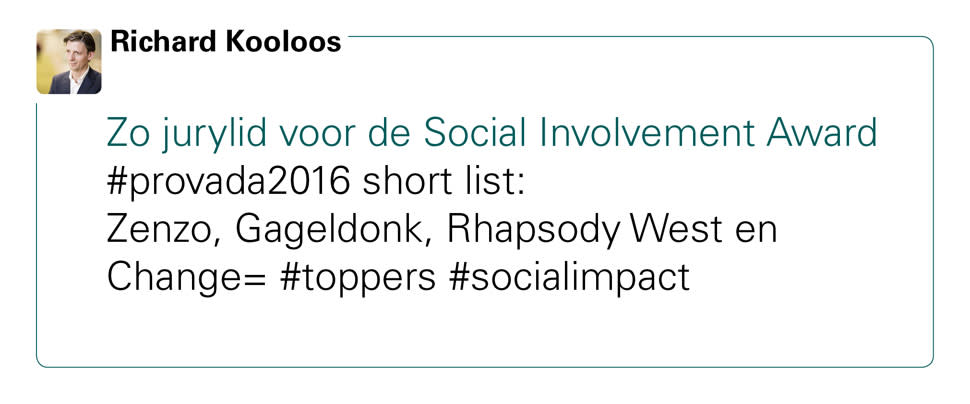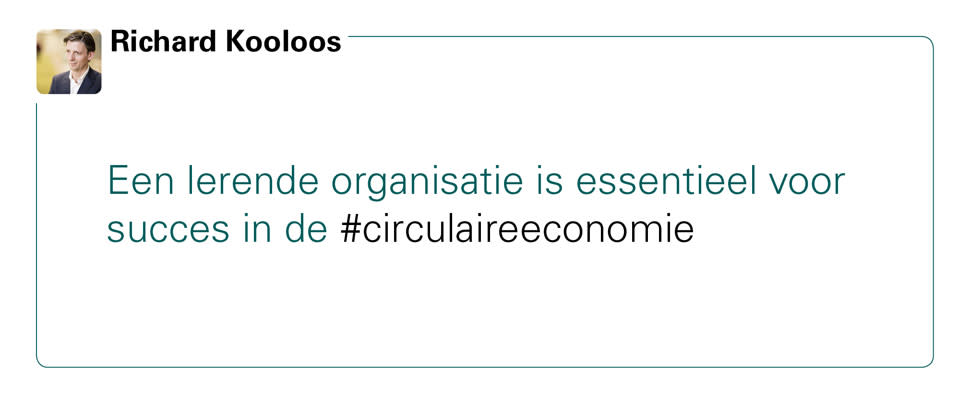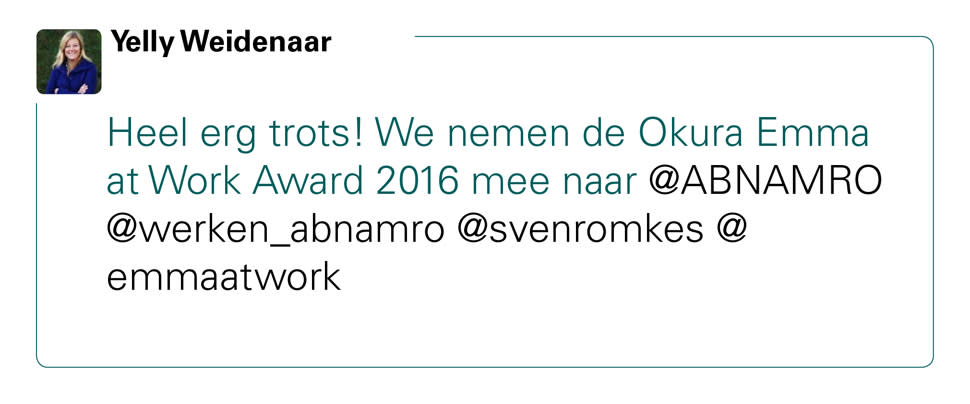Richard (re)tweets: ‘We really struck a chord’


Head of Sustainable Banking Richard Kooloos ranks his favourite tweets and retweets once every three months. This quarter’s picks: jobs for young people, an extraordinary banker almost awarded, buildings that bind, and fifty shades of green.
Richard Kooloos, Head of Sustainable Banking at ABN AMRO and registered tweeter, pressed the tweet button almost 3,000 times in just under 2,000 days. He shares what he thinks, does and sees in the world of sustainability. This is his selection of tweets from the past quarter.
‘The Sustainability Dialogue was a knowledge session about sustainability by and for ABN AMRO staff. To our pleasant surprise, it was fully booked within two hours: 450 people had signed up. And so we organised a second session. Apparently, this triggered something in my colleagues. We explained the whys and wherefores of sustainable investments, the circular pavilion and sustainable real estate. These are stories that inspire and help us get a handle on sustainability. So when you go home at night you have an answer ready when people say: ‘Yes, but Triodos is doing more’. ‘No, it’s us and Triodos.’ People want to be proud of the company they work for. We really struck a chord. I guess that’s because there’s more and more support for sustainability within and outside the bank – the Climate Summit in Paris and Urgenda’s lawsuit against the Dutch State are testimony to this. And during the Annual General Meeting many questions were asked about sustainability, and the bank was complimented for its integrated reporting. These days people want to be associated with sustainability. Only about six years ago, the Toyota Prius was a symbol of sustainability. Now it’s the Tesla, a car that appeals to an entirely new group of people.’
‘The Green Leader Award is an initiative of the Dutch Green Building Council and a prize for leaders who help make the real estate market more sustainable. Among the project developers and builders nominated for the award was a banker: Rutger Schuur, Head of Real Estate & Public Sector Clients at ABN AMRO. That’s quite something. People have come to know Rutger as a banker who is instrumental in improving sustainability in the real estate market. For the past six months he has been developing a new business model in which ABN AMRO encourages the clients it finances to become more sustainable. He is in charge of real estate loans to the tune of 15 billion euros and his goal is crystal clear: 30 per cent of clients with an A label for sustainability by 2018. He is our corporate activist, a man with a mission. Three weeks ago, he talked passionately about the urgency of tackling climate change before an audience of 400 bankers. In the end it was not Rutger, but Onno Dwars, Head of Acquisition & Innovation at VolkerWessels Vastgoed, who walked away with the prize. Although it was a pity, we are happy that the winner was, at least, a client of ours.’
‘The real estate trade fair PROVADA was staged in June. The picture this paints is often one of smooth operators and big-time money. But we consciously opted to present a social award at the fair: the Social Involvement Award for real estate that acts as a game changer. Examples are contractors who do more than renovate alone, giving underprivileged neighbourhoods a facelift and making their residents proud of where they live. So it’s not about the highest or most expensive buildings, but about buildings that do something for the community. I was a member of the jury that had a 50 per cent say in the outcome. The other half was decided by the general public. The winner was a project by Zenzo Maatschappelijk Vastgoed in the newly built neighbourhood of Vathorst in Amersfoort. The neighbourhood, called Hart van Vathorst, is multifunctional, bringing together two healthcare centres, a church and a childcare centre. The idea is to create a true community in which the disabled, children and other residents meet. The modern-style church acts as the glue that holds the community together.’
‘The circular economy is a central theme for the bank, and waste disposal and recycling have a special part to play here. At the Waste Conference, I talked about the growing importance of return flows. The waste industry is becoming a raw material industry. The managing director of Miele Netherlands pointed out that two thirds of all people in the Netherlands would buy a Miele washing machine if they weren’t that expensive. This means that when the purchase price is no longer a deterrent, there are endless opportunities for manufacturers of high-end products. Now what would happen if manufacturers were to sell laundry services rather than washing machines? They would then also pay the energy and water bills and would be triggered to lower these costs by being more energy efficient. Or they would be encouraged to build modular machines so that you only need to replace a spare part if the machine breaks down. Large manufacturers such as Daimler are already experimenting with a ‘car to go’, offering their customers mobility services. It seems increasingly logical for manufacturers to remain the owners of the cars they produce as this will enable them to re-use the spare parts as much as possible. These examples inspire others to come up with sound, positive and innovative business cases. Developments such as these give our clients energy and we help them make things possible.’
‘Emma at Work helps young people who are chronically ill or who have a physical disability find a job. The organisation celebrated its tenth anniversary in Amsterdam’s Okura Hotel where the Okura-Emma at Work award was presented for the fourth time. ABN AMRO was this year’s recipient of the award, which goes to companies that show that young chronically ill or physically impaired people can be successfully integrated in the workplace. Given the multitude of procedures and rules companies need to follow, helping people find work is rather complex, in particular when the job has to be individually customised. My colleague Yelly and her team make a point of really getting to know the candidates so that we look beyond their handicap or illness and see the talented person they are. In doing so, the team shows true leadership. All in all, I’m extremely proud that we manage to help these young people integrate in the labour market.’
